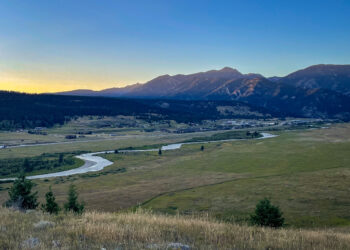Closing regional Forest Service offices
By Benjamin Alva Polley EBS COLUMNIST
According to a new federal proposal, southwest Montana’s national forest land could soon be managed by an office in a different state with a different climate, distancing the U.S. Forest Service from its existing regional office in Missoula.
U.S. Agriculture Secretary Brooke Rollins has proposed a significant reorganization of the U.S. Forest Service as it approaches its 150th anniversary. This plan includes closing nine regional offices and relocating them to cities far removed from the forests they oversee, raising serious concerns among stakeholders. Critics argue that this move is not merely logistical but part of a strategic effort to undermine the USFS and ultimately transfer control to states that lack adequate funding, potentially paving the way for corporate interests to profit from public lands.
The USFS manages 193 million acres of public land, historically divided into nine regions.
The nine regional offices slated for closure include R1 (Northern office in Missoula, Montana), R2 (Rocky Mountain), R3 (Southwestern), R4 (Intermountain), R5 (Pacific Southwest), R6 (Pacific Northwest), R8 (Southern), R9 (Eastern) and R10 (Alaska).
These offices oversee millions of acres, crucial for wildfire management and community support during natural disasters. The new regional hubs will be located in Raleigh, North Carolina; Kansas City, Missouri; Indianapolis, Indiana; Fort Collins, Colorado; and Salt Lake City, Utah.
These new locations have minimal forest service land, and this drastic reorganization threatens to slow essential management tasks, such as combating wildfires, maintaining trails, roads and campgrounds, removing hazardous fuels, assisting with search and rescue operations and responding to emergencies.
“Brooke Rollins’ reorganization plan will spin the Forest Service out of control. It makes zero sense. There’ll be less intel, fewer people on the ground, and nothing but chaos,” said Land Tawney, CEO and owner of the conservation advocacy group American Hunters and Anglers, in an Aug. 18 social media post.
Rollins claims that the reorganization is necessary due to the high cost of living in Washington, D.C., where federal salaries include a locality pay boost of 33.94% to accommodate housing costs averaging $800,000. However, many of the proposed locations, like Fort Collins (30.52% locality rate) and Salt Lake City (17.06%), do not promise significant payroll savings, especially since most public land in Utah is managed by the Bureau of Land Management, not the Forest Service.
Mary Erickson, former supervisor of the Custer-Gallatin National Forest who retired in early 2024, also expressed skepticism about the plan. “If you’re really looking for savings and belt tightening, focusing on the higher level of the organization doesn’t bother me,” she said in an interview with Mountain Journal. “It’s not like you couldn’t downsize the regional offices, but the transitional costs of that are daunting. As you eliminate regional offices, where does that work go? And how do you do that in a year’s time? That’s a lot of work. And they say they don’t want to do this in fire season. Those are pretty long these days.”
Erickson also noted that there hasn’t been a clear explanation for the choice of new locations, saying, “No one seems to know who’s the mastermind behind this design.”
This drastic reorganization not only jeopardizes the integrity of our national forests but also raises serious ethical questions about the motivations behind it. If this plan does not raise alarm bells among the public, then what will? It is imperative that we advocate for the preservation and proper management of our public lands, rather than allowing them to fall into the hands of private interests for profit.
“Now, the kicker is they are trying to do this as part of a bigger plan to break the forest service, break our public lands management system so they can sell it off to the highest bidder,” Tawney said in his video.
A public comment period on the new plan closed on Aug. 26, and the U.S. Department of Agriculture’s next step is to review the comments and determine whether to proceed with the new plan.
Benjamin Alva Polley is a place-based storyteller. His words have been published in Rolling Stone, Esquire, Field & Stream, The Guardian, Men’s Journal, Outside, Popular Science, Sierra, and other publications, and can be seen on his website.














